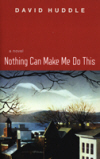Nothing Can Make Me Do This
Nothing Can Make Me Do This, a novel in linked stories by David Huddle, excavates the geography of loneliness and relationships. Each story looks at a sedimentary layer in the history of the Houseman family circle, not necessarily in chronological order. These characters, revealed in close third person narration or first person, do not wander geographically far from the home nest for very long. Journeys are internal and sometimes deeply buried. The through-thread in this family history is the voice of the secret sexual self, somehow unshared even in intimacy.
Nothing Can Make Me Do This, a novel in linked stories by David Huddle, excavates the geography of loneliness and relationships. Each story looks at a sedimentary layer in the history of the Houseman family circle, not necessarily in chronological order. These characters, revealed in close third person narration or first person, do not wander geographically far from the home nest for very long. Journeys are internal and sometimes deeply buried. The through-thread in this family history is the voice of the secret sexual self, somehow unshared even in intimacy.
Horace Houseman, provost at a Vermont College, faces late middle age and then unforeseen death in his early sixties. His wife inadvertently discovers in his study a secret stash of video pornography—aha; a straight arrow with a secret vice. Everyone is disconcerted; perhaps they don’t know grandpa at all. One worries, will this be another send-up of academia? Huddle’s project is more complicated. Eve, the granddaughter, relates her precocious preadolescent attempt to draw upright Horace into an intimate conversation, to explain his incongruous secret. They do talk about secrets and about what adulthood means, but they skirt the motivating issue. Yet, the grownup narrator Eve understands that the talk created a special connection between them. On his deathbed, Horace confides to her, “It wasn’t anybody’s fault, really . . . I was just made this way . . . I wanted to be close to people. Especially in the family. I really did. But I couldn’t manage it. . . . You know, loneliness is not such a bad companion.”
Meanwhile, Huddle has implanted the videos like a sleeper cell that keeps detonating explosions in unexpected ways. In a story titled “Doubt Administration,” we learn how they’ve come into Horace’s possession. He agonizes over an opportunity for an extra-marital dalliance with a newly hired dean, but, as always, “What leads Horace into temptation leads him right back out of it. . . . A moralistic imagination.” Lifelong friend Sonny, a multiply married drunk whom Horace protects out of loyalty and love, needles him. He offers “the cataract laser surgery equivalent for libido impediments,” the infamous porno stash. Horace, true to Sonny, makes a good-faith attempt to watch but is so repelled that, two minutes in, he gives up and never looks at them again.
A subsequent story goes back to Sonny and Horace as young faculty in their twenties. Including Horace’s new wife, Clara, a threesome friendship is formed. The young marrieds are in the throes of new sexual passion, keenly sensed by their new friend. Meanwhile, Sonny forms a crush on Clara that feeds his autoerotic fantasies. He recognizes that he is a “jerk” with real women and prefers the control of his fantasy life, but the real-life friendships create secret pain. This casts Sonny’s later serpent-in-the garden role with the videos in a more complicated light.
Bill, Horace’s son-in-law, is charged with disposing of “grandpa’s filth” after the funeral. In an endearing and self-deprecating voice, he tells us he adores his wife Hannah but senses an ever-present and unnamed disconnection from her that arises from her separate past. And what was the old man’s secret world? Like a taking a taste of heroin, Bill ends up in a web of porn addiction. “ . . . I give over to several minutes of deep sorrow for our man Bill. What a lousy life, his wife doesn’t go for his bedside manners . . . & now he’s contaminated himself with dirty pictures. Boo hoo hoo.” This story ends with a scene of subtle marital re-equilibration. Hannah archly asks, “Where you been, Billy?” “Swimming with the mermaids,” he tells her. No, really he’s just the “Old Farmer” who never went away.
Other stories explore adolescent friendship, the reverberations of first sex, first love, and loss. Hannah tells of her intellectual hunger in college, how it led to inadvertent mutual seduction with a geeky but charismatic professor. Horace observes his staid wife, Clara, in an unguarded moment singing along with passion to a rock song about wild, doomed love with a bad boy. In a searing portrait of widowhood, we see Clara questioning acquiescent wifehood, calling herself no better than a whore even in her tempered grief. And Sonny reaches out to a hurting young boy he meets in a volunteer program, sounding a hidden depth from his childhood.
Transgression can be real or imagined, from outside in or inside out. No one is privileged to see beyond his or her own small portion of the way the past displaces layers of the present. The complexity in Nothing Can Make Me Do This requires you to keep parsing connections. Huddle creates a landscape that is hard to leave behind with the final story.





